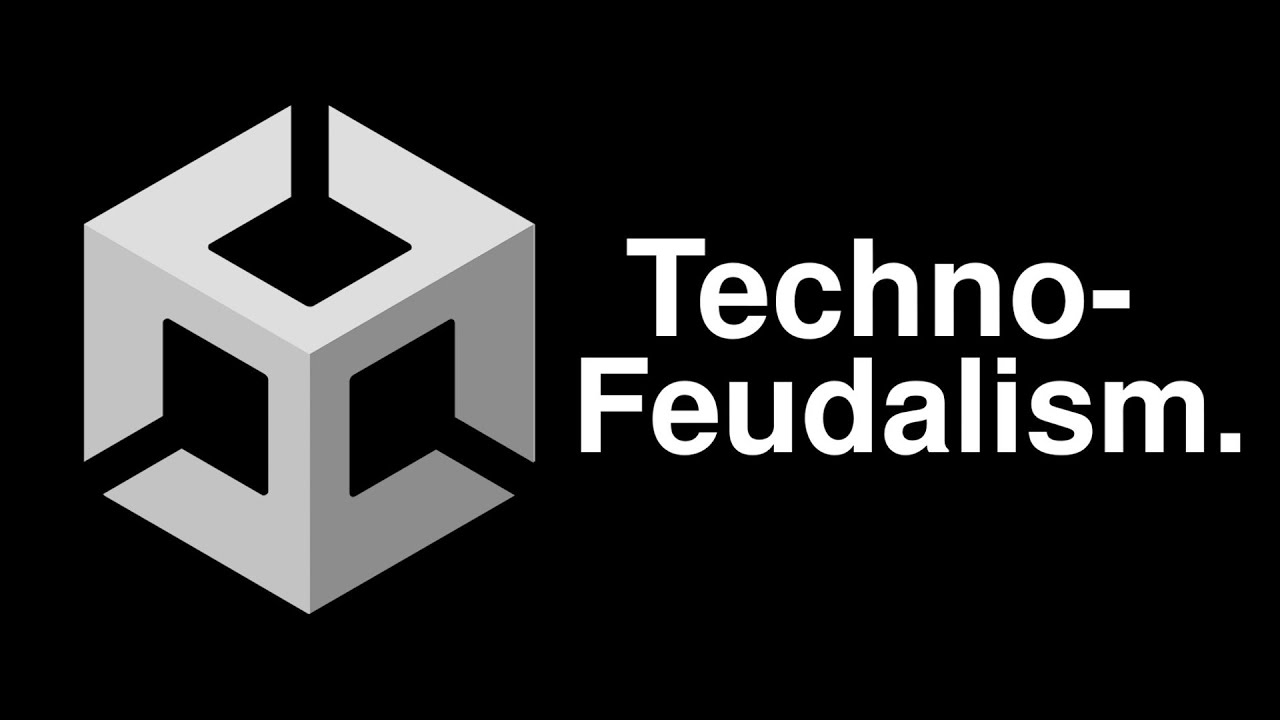cross-posted from: https://lemmy.world/post/5196308
It’s scary that the Unity debacle is not just happening in games but a very real threat not just in digital and app space but in real life.
It can happen in medicine, housing, even the food we eat if the trend of subscriptions and lock ins continue.
Despite this, a global concerted effort towards Open Source tech is still not happening.
In Unity for example, there is a push to transition to Unreal but less so for Godot. We see this happening with reddit too. And soon maybe we’ll see it in real life. What’s stopping our hotels and landlords from charging us everytime we open doors.
We see this in the rampant mandatory tips. Where everyone is automatically charged per order.
It’s scary and frustrating at the same time that there may not be a clear remedy for this. As the world shifts to subscriptions and services, do we truly own anything anymore?
Unreal is creaming their pants this week. They can’t have imagined a better sales pitch.
they just have to unveil some new shiny tools to convert from unity to unreal and unity is kill
There will never be a tool to convert Unity projects to Unreal. However there are already several to convert Unity to Godot, because both use C#
Edit: And as a dev that has used both, I just converted my project to Godot.
Edit again: It actually may be possible or at least be made easier using LLMs to convert to Unreal
How much work was it to convert ?
I guess the tool didn’t managed every single detail ?
Sadly it can’t work that way. From a programming perspective alone they are very different engines.
Unity uses C# while Unreal is C++.
We chose unity because we thought unreal model was shitty too.
Next time it’s open source, godot or stride or i don’t know, but not unreal.
They would have done the same shit if it worked
I’ve honestly been surprised that Godot’s getting a lot of hype out of this. I had expected MonoGame/XNA to be the big beneficiary – particularly for Unity’s 2D users, but also 3D (though I expected Unreal to benefit the most there just because of developer familiarity).
Godot is the closest alternative to Unity.
Unreal is kind of a different beast on a different market, more complex and more geared towards big 3D games with high-end graphics.
Unity worked on consoles. Godot don’t offer that.
Directly no but that’s because its legally impossible to.
So a lot of services exist that’ll do it for you, cheaper than unity pricing model yet (or you can do it yourself it just takes effort)
There’s even a company created by the godot devs specifically to fill this void, and the profits go back to development
They have been at the right place at the right time.
Never heard of MonoGame but from what I see, it’s much less noob-friendly, no editor etc. Looks too different
MonoGame/XNA used to be more relevant 10 years ago, but not so much any more (funnily enough, in large part because Unity ate their lunch).
It’s still pretty relevant. Some of the biggest indie hits of the last several years used it (Stardew Valley, Celeste, Supergiant games pre-Hades).
MonoGame is basically a continuation of Microsoft’s XNA which was their engine for the Xbox 360 era. It supports the full Visual Studio (not “Code”) so that’s the environment you get.
MonoGame has the advantage of being used to ship a number of indie hits, though.
Supergiant still uses an in-house fork of it for their games, if I’m not mistaken(ed. I guess they rewrote their engine for Hades).
Except Unreal already had the same kind of pricing structure that Unity is trying to move towards, that’s why Unity thought they could get away with it.
Ticketmaster is another real world example we’ve got right now. Or any service that adds on arbitrary fees that aren’t a part of the advertised price.
Ticketmaster is a monopoly that should have never been allowed.
Do we know yet if unity’s plan won’t work?
Games take 3-5 years to make… you can’t change engine mid-development so it’ll literally be years before they see any negative impact - during which time they’ll be making bank.
From their point of view that’s a success… shareholders care little about long term sustainability.
Developers are on the hook for potentially infinite losses without gaining revenue in a per install fee system. Expenses are entirely unpredictable for developers and bad actors can run basic install scripts to cost the company a lot, so if Unity stays their current course for a few more weeks, many of the larger developers using Unity will begin switching engines even if it means delays. It’s absolutely worth it for a developer to port their game over no matter the cost, because they are easily looking at no limits to their costs if they don’t
It’s quite the opposite.
Unity, like reddit, made a smart decision for sustainability that came with a bit of short-term outrage.
The people in charge at Unity can’t just take over their customers project and boot the Devs out if they protest like Reddit did with Subreddits they protested for too long where they just banned the mods and took over the subs that had gone dark.
There’s way more control in the Devs hands in this instance but Unity seem to be trying to rely on the fact that it’s a massive pain in the ass to switch to a different engine mid development but that’s definitely not stopping some people from making the migration still.
I am a strong supporter of open source tech. Specifically the proper FOSS flavor.
It is NEVER going to be a valid alternative when there is a massive multi-million (if not billion) dollar alternative with an affordable license. Because it takes time to develop these feature sets and time is money. Even someone working in their spare time can’t put in a full day of work… and are likely burned out FROM a full day of work.
And that ignores the tendency for GPL-like licenses that are straight up cancer as far as companies and products are concerned. I respect the ideology but… that is WHY companies are less likely to pull a Valve and dump massive amounts of money into supporting open source projects. Like, every time someone pushes a cool piece of software with a GPL-like license I just think “Cool, you are actively making sure your feature set never improves anything”
The best we can hope for is the model used by Ubuntu and the like. An open source project backed by a corporation that sells support. And… the open source community almost instantly turns on that and decides they are evil and starts going out of their way to shit on it at every step of the way.
As for the overall idea of “do we even own anything in this world of subscriptions?”. That, much like with the “I bought the disc so I own this game” mindset is very much a fallacy. Because you can get a life time license to version 1.2315151651616 of FooSoft. hell, you can even get 1.x of FooSoft. That… doesn’t matter because the moment a CVE is found in FooSoft or its dependencies you need a new version. Which is WHY we tend toward these subscription models because we know we need the updated version.
Like, as a good example: Basically ANY new hardware or software suite needs support for Red Hat, and to a lesser extent Ubuntu, if they are planning on selling their products. Because any company worth its salt is picking a distro with a support model. Which basically means RHEL and whatever the paid Ubuntu is. Because even ignoring any tech support aspects, a support contract is a guaranteed timeline for fixing vulnerabilities.
An open source project backed by a corporation that sells support. And… the open source community almost instantly turns on that and decides they are evil
Redhat was the golden child of the open source community, the paragon of open source success stories, until fairly recently.
Canonical was also very highly respected until they started putting Amazon ads into people’s menus.
It is not something that happens instantly for no reason, it’s because of the need for these companies to squeeze every last drop of revenue out of a product to appease shareholders. Open source companies can, and do, thrive without screwing their communities over. The problem is the mindset that creating value for shareholders is the only thing that matters.
That mostly is a symptom of actually trying to offer a Product. Donations alone aren’t cutting the full time staff that you need to provide any kinds of guarantees. I mean, look at Lemmy. There was a CVE a few months ago and people were losing their minds that the two main devs didn’t take time to do a proper writeup and instead focused on fixing the issue while keeping an eye on the community discussing it and informing others. It was amazing that they were able to get it fixed so quickly but “NOT GOOD ENOUGH”. And… the way you get the resources to be “good enough” mostly involves monetization. And, shockingly, most of the people who get angry when something is added and say they would have donated otherwise aren’t speaking in good faith.
As for RedHad: Disclaimer, I am currently in the process of working with partners over the debacle of Red Hat seeming hell bent on killing Rocky. And… this is after they killed CentOS. As a developer, having a “free” version of the OS we are targeting is incredibly useful. It lets us nail everything down at low cost and run a limited subset of paid nodes for final debugging before we send it to the customer who requires RHEL.
But also? A LOT of end customers also run a metric shit ton of Rocky nodes. Unless it is outward facing or can’t tolerate any downtimes, use the “good enough” free version. Which then leads to discussions of “okay… if most of the fixes end up in Rocky a day or so later than in RHEL, do we really need to pay for a couple hundred licenses when we could instead split Fred and Chris’s time for internal support?”. Which rapidly leads toward most of the paid customers of RHEL not being paid customers anymore.
It is shitty but… that is the difference between consumer and enterprise. When a failure leads to an hour or two of my personal time to set Nextcloud up again because the underlying infrastructure hates the idea of containerization? Whatever, I genuinely find that fun. When a failure leads to a bunch of angry customers who now have lost faith in me and a bunch of employees working frantically so that we don’t lose a customer and, thus, revenue? We aren’t going to be risking anything to a hobbyist platform that is prone to catastrophic errors because there just isn’t time to fix it (also, Nextcloud has a paid version which makes this even funnier).
But as a consumer? Those fuckers are putting ads in the start menu and making it harder for me to remember what the GE proton update tool is called.
A universal basic income would allow more developers to choose to work on software they actually like, rather than the demands of business and their proprietary models.
Most UBI solutions (which I very much support and voted for Yang in the primaries for…) tend to be built around the idea of providing cost of living for “free” but encouraging people to still suck capitalism good if they want more money on top of that. Which is “good” because it is how you get those rock star developers focused on major products.
But that more or less makes the same problem. Sure, there are going to be people who genuinely want for nothing more than three meals a day and spend the rest of their time doing hardcore development. But, even then, they likely are never going to be “challenged”. I’ve worked with some AMAZING developers over the years and have learned a lot from them. And I would hope they learned from me. Because, during a code review, you see how Nancy solved a problem and might try to incorporate that pattern into your own workflow and so forth.
But when you are more or less the sole “ninja” developer on a project and are mostly working with college kids who can remember what the various design patterns are called? You are likely not being challenged in the slightest and you “stagnate”.
And most people who live and breathe “awesome code” are doing so because it lets them do fun stuff on the weekend. Which, until we live in a post scarcity society, needs money/resources.
Hell, if I haven’t already pissed off more than enough people with this, I’ll add on that I have never met what I would consider a “good” software engineer who doesn’t “work for the weekend” as it were. Because if all you want to do with your entire life is code? You never stop iterating. You always want to make the code better and I need to regularly “check in” with you to make you push code to a repository or remove the WIP from your MR. Whereas the people who want to finish their job so they can go climbing or take a trip to the beach with their family or just blow money on hookers and blow? They are able to realize when something is “good enough for production” and they get a LOT more done.
There are free OS nowadays that are Better than the paid ones (especially the most used one for desktops).
What do you need your PC to do? If it’s word-processing and spreadsheets you are already ready to go free. Other software or “solutions” will come later.
It just takes time because the money is pushing hard the payment models.
What can happen, and actually happen in a lot of software fields, is multiple companies investing in the tool. That’s the case for the Linux kernel, for databases, for programming languages…
Many game companies even have their own in-house engine. Instead of investing in that (usually sub-par) engine, they could be investing in an open Source engine.
I don’t understand why this doesn’t happen in games. And don’t tell me that they want to keep their own engine as a competitive advantage, because most in-house engines are shit.
The reality is that there is no one size fits all engine. Unreal and, to a much lesser extent, Unity come close, but they still favor very specific scales and styles of gameplay.
Like, for as dated as it feels, Bethesda’s fork of gamebrio or whatever it was is a REALLY solid engine for the kinds of games they make. Geometry interactions are still a bit funky, but it allows for massive scale and high fidelity because exterior regions are broken into cells in a way that favors (what we would now call) streaming. But if you want a game where you seamlessly go in and out of buildings (similar to the recent Yakuza/LAD games), it is laughable and, to my knowledge, still treats every building as its own world even as of Starfield.
And when you try to make one engine do EVERYTHING? you get star citizen where a refusal to do any form of load masking means that they need to be able to simulate space ships light seconds away from each other AND infantry centimeters away from each other and you basically see the physics engine explode every few seconds as a result.
Maybe you aren’t a fan of the in house engines. If it does one thing that “wows” then that is likely how they got their publisher
Also: it is obviously corporate backed, but Unreal Engine kind of is that. Sony has put >400M USD toward Epic/Unreal Engine and other studios/publishers put smaller amounts in.
The right-to-repair movement is showing us cyber-feudalism will fail in time, as is the failing BMW subscription seats thing. We may be moving into a golden age of service and media piracy in which households throughout the developed world simply resort on cracked services. We may be using cracked ink cartridges and illegally-jailbroken refrigerators until they realize the compound public resentment and ingoing war against pirates is cutting more into profits than is gained from rent seeking DRM
We’ve already seen how the efforts by the record lables to litigate against children and elderly can go poorly and just increase piracy (or worse, decrease engagement).
But it means we’ll have to suffer more as the paradigm shifts. Capitalists are not allowed to relent when it comes to profit seeking, making them the enemy of the people. And a government that favors commercial corporations over the public (as is the case in the US) is also, by definition, the enemy of the people. It means any transaction is predatory unless there is a force acting in the interest of the worker and the consumer that effectively dissuades contracts without parity.
I would use open source but there are no open source game engines that support VR with controller and hand interactions, let alone online avatars. Open Source is just behind in a major way in the VR/AR space and I hope it makes closing that gap a priority.
There are strong indications that Valve’s Deckard is imminent. Whether that is a standalone VR device or a “console” like steam machine with a heavy emphasis on VR is up for debate.
But it should result in a much stronger focus on non-proprietary VR libraries that are OS agnostic. I doubt it will make for a massive market share increase, but it will hopefully make working with ti more palatable for the various free engines. Because NOBODY wants to spend their free time interfacing with facebook. But OpenXR (or something actually good?)? We’ll see.
I remember when FB bought Oculus and everyone was outraged swearing to boycott and maybe they did, but the Quest went on to be the best selling VR headset by a lot.
Techno -feudalism

Strangely enough, don’t feel like laughing.
what’s funny tho? dude has a point
The absolute absurdity of framing and drawing comparisons between the technology sector and feudalism.
Well that’s why he called it “techno-feudalism” because he does recognise it’s anachronistic
Have you watched the video? The point stands tho. Argument goes as follows: “just like in feudal times you were forced to pay a rent for the privilege of living on the land of your lord, likewise nowadays companies seek to establish a rent seeking position, like leeches, where you pay for the sole privilege of using their product. It’s different from ‘a price’ because customers often have no other choice.”
Oh I guess there aren’t open source alternatives.
Just sounds like an interesting name for SAAS.
SaaS, literally slavery.
Requesting source of the emoji.
Google GBoard built in!













